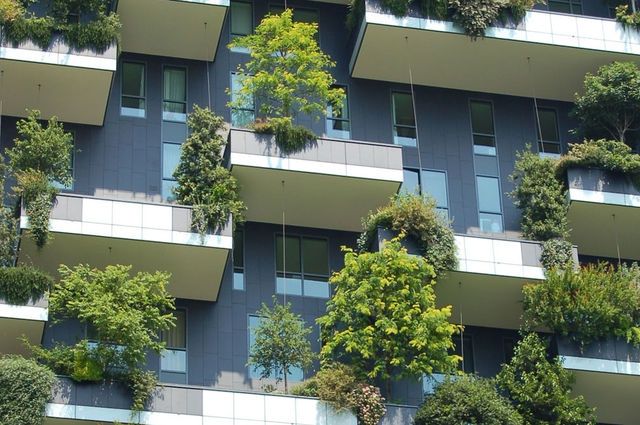Climate Emergency And The Hospitality Industry: Are We On Track?
14 experts shared their view
The hotel industry must reduce its greenhouse gas (GHG) emissions per room per year by 66% by 2030, and 90% by 2050 (see ITP, 2017). However, looking at 10 of the largest hotel companies, only one sets a goal that is in line with the science-based targets. Decarbonization has long become an integral part of risk assessment in other industries. Considering the current growth in hotel supply, the industry has already committed future carbon dioxide emissions via (often) poorly designed and air-conditioning hungry new properties. What drives the lack of commitment in the hospitality industry? What keeps developers and investors away from building a carbon-neutral future? What are the main obstacles ahead? What can the industry do better and how?
Fundamentally and for the most part, economic opportunity and its reward spearhead owner and operator hotel development decision making. Sustainable initiatives are less of a priority compared to economic gain and hence the lack of commitment for a carbon-neutral future. This is a general opinion because there are investors and operators leading more meaningful environmentally conscious hotel development, but they are the few.
There is plenty the industry can do better, but I am afraid the big changes we all expect will be influenced by either guest demanding or preferring a hotel that has a higher sustainable standard or government-led policy with economically motivated sustainable initiatives. I do hope I am wrong and do believe hotel operators can lead the way, which I am sure they will in time.
The most recent announcement by the Intergovernmental Panel on Climate Change (IPCC) stating 'unprecedented ice melt in the next 30-years and resulting rising sea level', attracted the sky news headline 'don't buy coastal properties'. This got me thinking of the impact this news has on the now popular Artic resort development and other coastal hotel developments. Will such news deter investors and operators, or will the economic opportunity be of greater pulling power or can such developments be driven by a meaningful sustainable initiative?
Writing on behalf of a hospitality company that set science-based targets for emissions reduction in 2017, I recognize that addressing climate change is far from simple. Despite the good progress that has taken place to improve efficiency and thus reduce emissions in the hotel industry, new challenges are emerging: an increase in energy consumption of buildings due to addition of data centers, use and charging of a multitude of devices, rising entrance of robotics and automation replacing human power with electricity, and an increase in temperatures and poor air quality resulting in higher air-conditioning and ventilation demands. For our Integrated Resorts, commitment to science-based targets provided an actionable mandate for implementation of energy efficiency measures. While we may not achieve these stringent goals, we will certainly not leave any money on the table in terms of potential electricity cost reduction and will be better positioned to offset the emerging trends that we are facing.
Although the hospitality industry has become interested in sustainability reporting, concrete and significant improvements in the field are very limited. One of the multiple reasons behind it is that the costumers do not seek sustainable and green technology, yet, hence hotels are not obliged to install innovative solutions for a more sustainable industry. At the moment very few hotel guests choose their rooms because of environment-friendly installations at the hotels. Their decision is mainly based on price-quality indicators and not on environment-friendly practices. So, on the one hand, hotel clients should be more demanding for green hospitality that can be achieved by improved green marketing. On the other hand, there should be a very concrete political engagement that facilitates the installations of green technology. Let us hope that the recent German climate package will have a deep impact on the hospitality industry as well.
During a visit to the new Van der Valk hotel in my hometown Leeuwarden (the Netherlands) I asked the owner why he chose to finance the massive investment needed to build a BREEAM certified property. He answered: “ I am not a sustainability adept; yet if my property would not get an excellent BREEAM certificate, it would lose 20% of its value at the moment of opening”.
This anecdote illustrates not only that there are many ways to a carbon-free society but also that markets have a major role to play. To this I would like to add that legislation is also key in pushing hoteliers and investors towards carbon-neutral buildings. In Amsterdam, for example, the municipality decided some years ago that all new hotel property development projects should satisfy the highest possible BREEAM standards. Since then, Amsterdam got hotels such as Jakarta and Q/O: outstanding examples of sustainable properties.
Carbon emissions are an important individual topic, but to me they reflect the bigger sustainability issues in the tourism and hospitality industry. While these detailed areas require specific solutions, the problem is broader. Does the industry at large want to remain a mere fulfiller of hedonistic aspirations, a situation where it often appears acceptable to ignore sustainability considerations if they form inconvenience or restrictions to a guest?
The modernized alternative would be to accept sustainability as a business goal and include it in the company mission. Examples of this include Tesla in instigating the large-scale development of electric vehicles in the car industry, and Beyond Meat in bringing environmentally sustainable alternatives to common meat products. Both serve consumers interested in sustainability by providing an environmentally friendly customer experience that compares with the earlier alternatives. Can the hospitality industry innovate and embrace comparable missions that incorporate profitable business with a sustainable purpose and transform a delightful hotel stay into an ethically meaningful guest experience?
As a sustainability consultant to the hotel industry, there is very slow movement toward sustainable hospitality. The major hotel brands that have set goals do so for the properties they own and manage, which is perhaps 10% of the hotel inventory world-wide. They do not require investor-owners to adopt their goals. Travelers need to demand sustainability, and organizations, such as the American Hotel & Lodging Association, and their state counterparts need to provide the education of the benefits.
The challenge of reducing carbon emissions isn't a question of lack of commitment – we see many measurable examples from our members on how they are decreasing their carbon impact – but rather a result of the complexities of the industry business model. The people who build and own the hotels are not usually the people who manage or run the hotels. Consequently, the operators are not necessarily able to influence many of the carbon efficiency decisions of the buildings in which they are operating. In the case of the larger operators, they will manage thousands of properties globally, yet they need to deal with owners at a property-by-property level due to the fact that the bulk of owners may own only one or two properties.
The industry requires better co-ordination on sustainable building design starting from new constructions and building refits. Ethical considerations aside, the key is to understand the different motivations and ensure that the financial benefits for sustainability are compelling for every stakeholder. For example, asset owners will be interested in how the building will increase in value, and how much rent they can charge. Brands will want to support the increasing sustainability preferences of their public and corporate customers, and the operators will be influenced by efficiencies they can make to their running costs. Improving sustainability will deliver on all these requirements, but it's not without an initial investment. If we have a co-ordinated approach – an industry-standard requirement for sustainability – that will ensure such implementations will become automatic and reduce the risk of prioritizing short-term investment over long-term benefits for all involved.
At International Tourism Partnership, our work brings together the hospitality industry to build a more sustainable future for our planet and its people. We commit to working collectively with our members on four key areas – including carbon. Four of our members have set or committed to set a science-based target for carbon emissions, one member is carbon neutral for both direct and indirect emissions, with other members working towards significant carbon mitigation initiatives such as 100% renewable energy use. Our free Hotel Carbon Measurement Initiative tool is currently being used by over 25,000 hotels, demonstrating that there is a willingness in the industry to address carbon emissions. Our current focus is therefore to further engagement with the wider industry value chain including owners, investors, operators and franchisees, to drive sustainable building design from inception to operation.
This past year, we witnessed the many initiatives surrounding the banning of plastics straws and the replacement of miniature bathroom amenities, those are to be applauded. However, the attention should not be distracted from the larger picture: Considering the current growth (with roughly 3000 energy-guzzling hotels joining the supply this year alone), how many of those new properties have joined the ranks of carbon-neutral hotels?
Hotel companies are, like any other businesses, trying to run as efficiently as possible. And any bigger, large-scale change, such as retrofitting a building to be more energy-efficient, often requires the approval of multiple parties. But these actions are always at the end of the pipeline. In fact, the industry requires investors, developers, brands, architects, and operators to act in unison when it comes down to carbon-neutral properties. On a positive note, matters of sustainability are finally cropping up at hotel investment conferences – long overdue.
The myriads of sustainability measures implemented over the past two decades are certainly good when assessed in isolation. But in fact, the sum of those measures is by far not enough to reach any climate goals. The argument here is that our industry cannot wait to start in 2030 to shape the hotel sector of 2050. The 90% reduction in emissions by 2050 needs actions today. And one action is to set bold, transparent and solid goals, and then to move on with your Plan-Do-Act-Check cycle.
The referenced ITP scenarios are based on the clear forecast that the hotel supply will grow immensely in the coming 2 decades. Sustainability needs to be addressed from the beginning of the hotel project, even before operator selection when initial feasibility is done and/or capital investment is decided. Those in that value chain need to be fresh on the trends and opportunities for installation and procurement of renewables and efficient equipment, including green finance. We have plenty of data available showing the scenarios of efficient vs. inefficient hotels and what they represent in operating costs as well as risks, and owners need to be made aware of what they'll lose. When given the chance, owners need to be engaged proactively in the topic by development teams with positive selling aspects of it (instead of fearing mention will hurt their chances of signing the deal).
After all, there is often an element of prestige in owning a hotel, and we need to tie that prestige to the legacy of sustainability, especially among younger owners, since significant decarbonization among large hotel companies can only be achieved if the owner invests in and approves funding to reduce energy and carbon. So let's get more owners to read this panel!
Trying to widespread sustainability in the tourism industry for the past 15 years I should say that I'm a bit disappointed. I feel that the persons in charge don't even understand what greenhouse gas emissions means. They are obsessed by other topics and don't see that the industry is at risk and will be accused (rightfully) to do nothing.
Without knowledge, without understanding, without long term vision, it's almost impossible for them to take action. Which is quite paradoxical as it could result in considerable savings. I have hundreds examples of water or energy savings easy to implement, low hanging fruits desperately waiting to be picked up and rotting on the hotel trees.
There is a need for a deep mentality change, including the owners, the operators and the architects designing sick buildings. How is it still possible to build this giant ovens/hotels and believe that air con will solve all the problems when natural shade and appropriate orientation could do part of the work?
Let's hope that the next generation will break this state of mind and understand that not taking into account the environmental impact of the properties they will own, build, manage is like shooting themselves in the foot.
The hospitality industry is driving fast – looking in the rear-mirror and hence assuming the cruise runs smoothly. Developers and investors should better keep their eyes on the way ahead. By doing so, they would follow the precautionary principle and rather invest in a carbon-neutral future than continuing their business as usual. The main obstacle probably still is the “charming” possibility to externalize all environmental costs. However, when future clients march “Fridays-for-future” everybody in the business should understand that applying sound measures to combat climate change, communicate openly and honestly and take scientific warnings seriously, will pay-off in the long run. We need products that internalize environmental costs and establish products that have net positive impacts on climate, biodiversity, and ecosystem services.
Don't talk! Act!
We are far from being on track, and from my 11 years of operational sustainability experience in hotels, things have hardly changed since my beginnings. How so? An obvious lack of group strategy, coupled with the absence of tangible KPIs (i.e. CO2-e/room-night, KwH/guest-night) attached to verified reduction targets, no accountability on sustainability performance metrics from high-level executives, short-termism at the operation level (Hotel GMs stay for 4y max), and a cruel absence of resources (money, people, time) allocated for impactful projects are the main reasons for the industry to be so far behind.
Generally, there is an important misunderstanding from the industry about the link between sustainability and risk management, or how the mis-management of natural resources in destination hotels operate in will unavoidably badly impact their own top-line.
Things cannot change fast enough if hotel and culinary schools do not embed sustainability in the educational system in a much more extensive and practical way. I often get master students as trainee who have hardly attended any class on the topic. And as employees get often no exposure to what sustainability programs are in place while working, chances for a change of mindset are slim.
Finally, the huge gap that exists between the official discourse by Corporate Sustainability (and Communication!) Executives, and the sad reality of operations highlights the fact that cosmetic changes ("Skip the straw") is what prevails now.
Here are a couple of thoughts from my perspective: Too much opacity in the brand-ownership model. Brands make the commitments with little or no teeth at the operational/ownership level. Owners can benefit from the halo effect of corporate announcements without (full, immediate, consistent) implementation. When I teach sustainability to travel buyers and event planners, I always hear how so-and-so hotel (specific location they worked with) did/does not have the sustainable practices touted in the news (this usually follows me giving an example of that corporate office announcing a new target or commitment). I'm sure this is a tough battle for the corporate sustainability offices.
Another big issue is building versus operational. We seem to have momentum at the development level to build LEED certified properties (and to your point about 'poorly designed' I'm sure this is a debatable point) but if all the lights are left on and no one is monitoring the building mgt system then we have a disconnect. We need the same momentum with operational certifications (e.g. Green Seal, Green Key, etc.). Not that these are a perfect/complete answer, but that external accountability could help.
Taking this road and becoming serious about the hospitality industry's obligation to do its fair share in combating the current climate crisis will need significant investments in buildings and infrastructure. Doing so, however, means directing capital away from shareholder returns and/or expansion plans. Given current shareholder expectations and expansion pipelines, I doubt that our industry will start pushing for this development voluntarily and in time.
Hotel companies will need to say goodbye to their current growth-above-all-paradigm and move to a consolidation and CO2e-reduction-above-all goal. The industry needs to fathom how a no-growth age could look like that focusses all available resources on becoming carbon-neutral.














